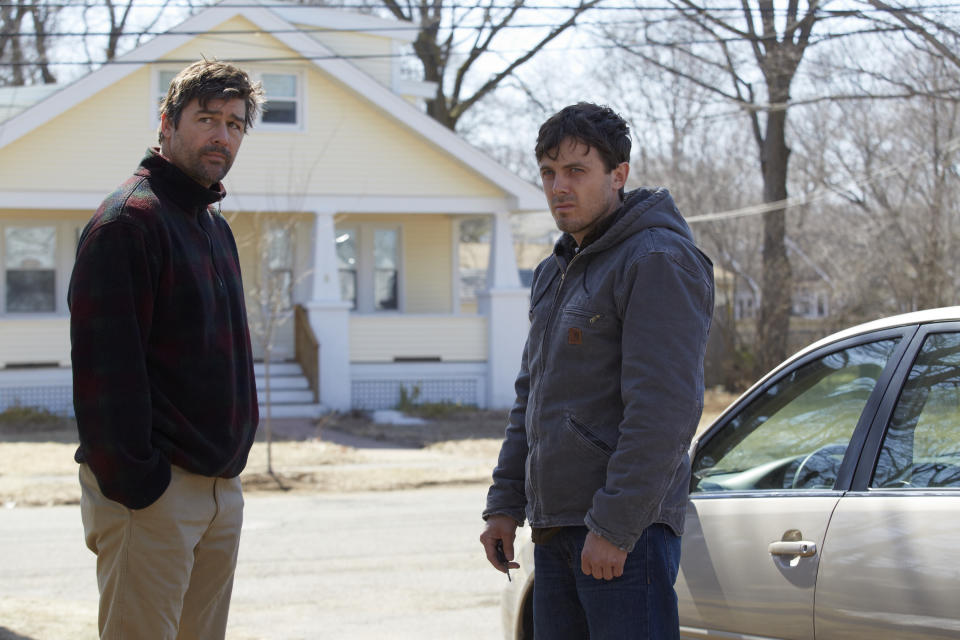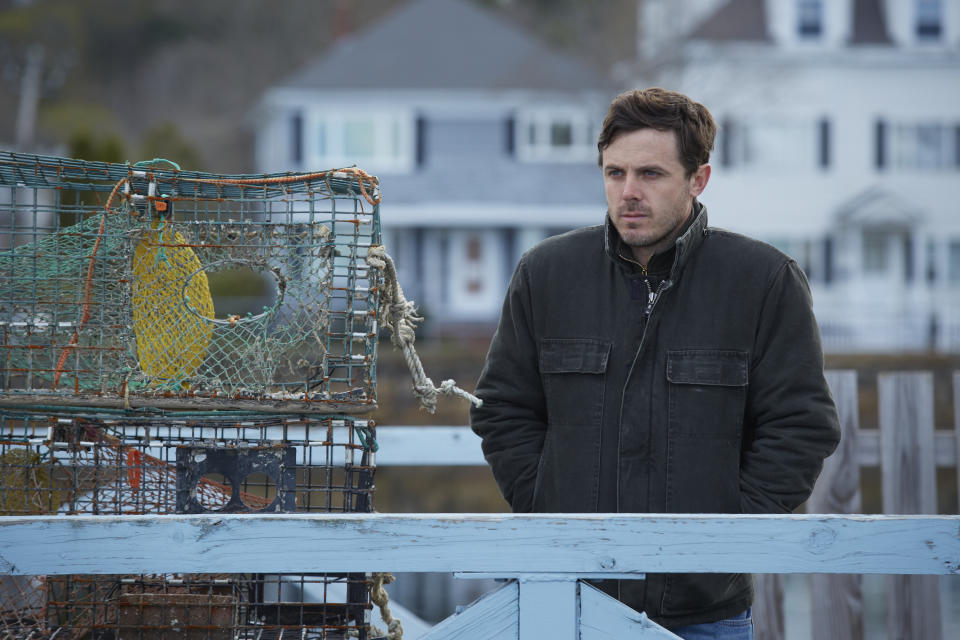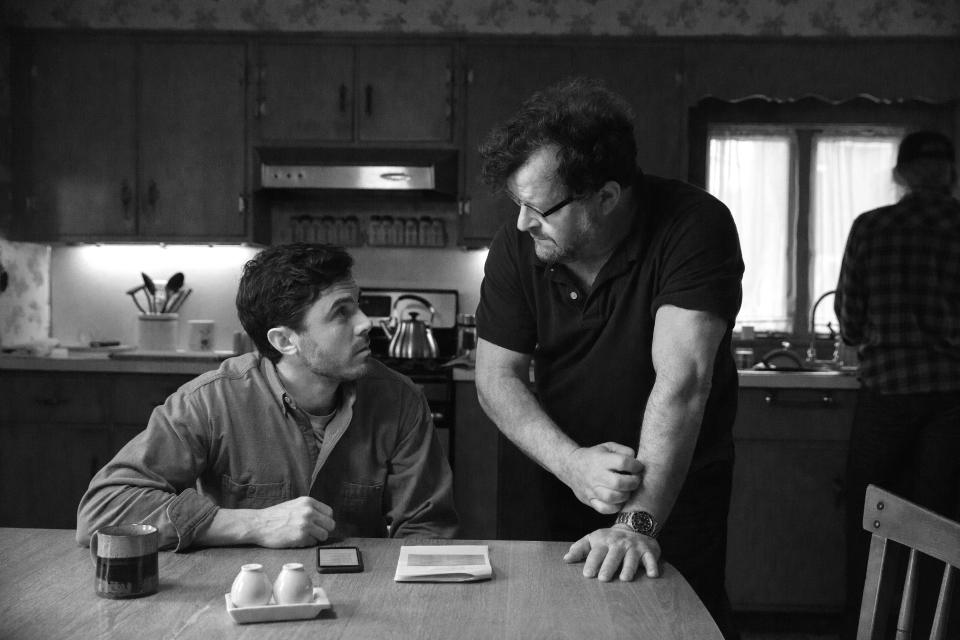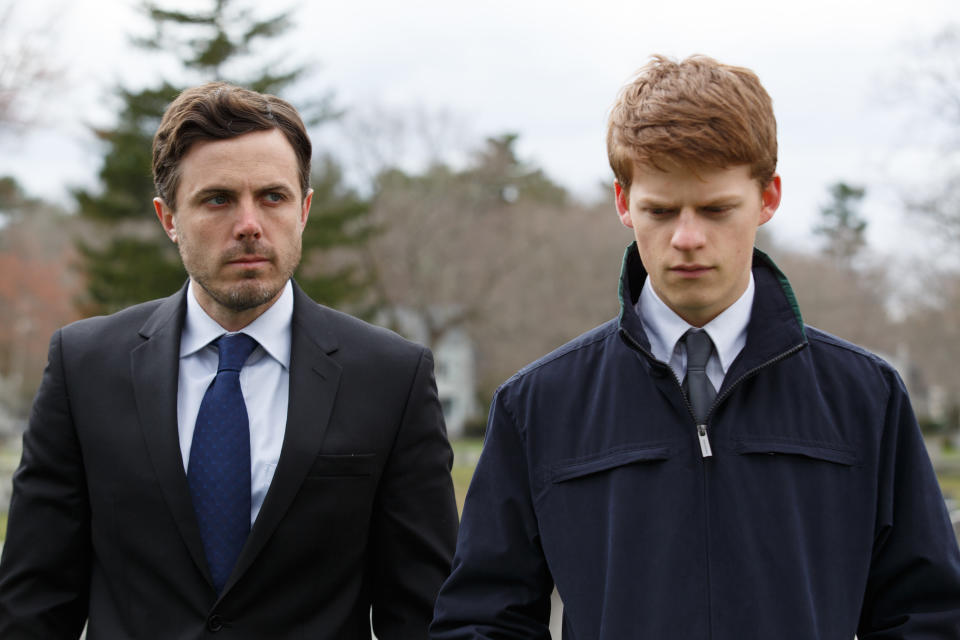Encore: Casey Affleck On ‘Manchester By The Sea’ And Lonergan: “He’s Playing A Different-Sounding Song”

Editors Note: This story originally ran on November 18, 2016.
Casey Affleck’s haunting and haunted performance in Kenneth Lonergan’s Manchester by the Sea might have been amongst the first crop of fresh Oscar candidates when it premiered at the Sundance Film Festival back in January. But the fact that he’s still a Best Actor frontrunner 10 months later must surely be pleasing Amazon Studios, which picked up the movie there for $10 million with plans to make its first Academy run. Manchester was the second biggest acquisition at Sundance this year, but it now feels like the smartest.
Of course, Affleck is already Oscar nominated, for his supporting turn in Andrew Dominik’s The Assassination of Jesse James by the Coward Robert Ford. He’s going for the win this year as Lee Chandler, a Massachusetts man forced to return to his hometown when the untimely death of his brother turns him into the legal guardian of his nephew Patrick. But there’s a dark secret in Lee’s past that made big news in the town, and facing those ghosts isn’t easy for him.
Like all of Lonergan’s work, Manchester is at turns heart-breaking and hilarious, and always instantly—sometimes uncomfortably—relatable. And Affleck soars in the lead, dragging us into his character’s troubled headspace with a level of craft that can’t be ignored. It’s the kind of emotionally tense material with which Affleck thrives—think Gone Baby Gone, Jesse James, Gerry—and it’s hard not to draw parallels with a young Brando, so assured and affecting is his brooding intensity.
Affleck’s relationship with Lonergan goes back to the London production of Lonergan’s play, This is Our Youth, in 2002. Sitting down to discuss Manchester at Deadline’s LA studio space, Affleck credits his writer/director with delivering the goods that allowed him to shine.
Describe your first read of this script. What kind of effect did it have on you?
It’s funny, it was one of those reads where you stop analyzing. Sometimes you read something and there’s a part of you that remains in an analytical, actor place. Am I going to do this movie? Is this a good part for me? Is it not? Can I bring something to this? Almost immediately I was just absorbing it like it was some piece of nonfiction; some complete piece of writing that was, in and of itself, a thing. Not a blueprint to be built upon. It was complete.
It was hard to describe why it worked so well. I have said sometimes that it’s a bit like a piece of magic; it’s like this sleight of hand trick where you’re absorbed, following the story and listening to these characters not talk about what’s really happening in their lives, through talking only about the kinds of things right in front of them. It fuels this perfect slice of life with uncanny verisimilitude, and then all of a sudden, you realize you’ve been led to a much deeper, more meaningful experience at the end of it. The emotions really snuck up on me. I was crying at the end and I had been laughing throughout.
I put it down and I told Kenny what I thought of it. And then a year later he said, “Hey, you want to be in it?”

It had a strange effect on me. Even though I have never been through anything near what your character goes through, I understood that human fault to beat yourself up for mistakes in the past. I saw myself in it.
Yes, that does make sense. I think probably those are some of the ideas people have when they watch the movie, for sure. The idea of the character wrestling with trying to undo something that he had done wasn’t exactly the slant I was coming at this from. It’s very hard to distill the movie to a soundbite or a sentence or two of description. I have tried to do it myself sometimes, because I wanted to understand what this is all about. It’s affecting me in a very powerful way, but I want to get a handle on it.
That may be why it lingers in people’s minds after they see the movie. It’s a mess: the happy moments and the very, very tragic moments in this character’s life are very hard to pick apart, even though they’re very distinct. There are these really happy times before the tragedy happened, and then everything that was after. Also, the way that the story is told leads me to some conclusion about Kenny’s intention, which is that it was very much about how all these memories are all mingled together: it’s what makes up a life. Even after the tragedy, there are moments of humor and love and hope. Beforehand, there are moments of miscommunication and pain. I think he likes to make things realistic in that way, and for that reason, likes to have very naturalistic performances.
One of the things that works really well about all of his movies and plays is that it feels like real people. You just feel like you are watching real people go through some period of their lives. Therefore, you care about the characters in a way you might not if it had been written or directed with some stylization. I think also—and I don’t know if he would support this idea— he is such a talented writer, just naturally gifted in some ways and such a hard worker, that in the writing, he’s able to make stories work without employing very familiar conventions of storytelling and screenwriting. For that reason, the film and his plays strike us, as they’re not just hitting the same chords we are used to listening to—and therefore have become a little bit numb to. He’s playing a different-sounding song, and it makes us all a little bit more engrossed.
Where do you begin trying to work out how to play a character like this? Is it a daunting prospect—balancing all those ups and downs— or is it an exciting one, because it’s really going to test you?
The idea of being the person at the center of it was daunting in some way, because it’s a really challenging part, having to convey an awful lot of the interior life of a person with almost no opportunity to speak to that. It really just has to be palpable in the way that he behaves, and the tone he takes with people, and the very, very few moments when he cracks. That was tough.
I also know Kenny’s writing is so good that there’s a lot to discover in the movie. It’s not something you can clearly see at first glance. You have to read it again and again, and hopefully by the time you’re on set, shooting it, you have a sense of what’s happening that is deeper than just the words that are being spoken.

Is there a balancing act between the happy and sad extremes you talked about? The film jumps between them, in time, and presumably you weren’t even shooting in sequence.
We didn’t get to shoot in order. You never have that luxury, especially on a movie like this where you have zero money and even less time. We had to jump around. It was important that I keep in mind the before and after, so there’s a real change. But also, within that post-tragedy, there has to be its own arc in terms of, this is where he starts, this is where he gets to—because people do change a lot. It’s also one of the things the movie is about: watching this seasonal shift in their lives.But the disjointed nature of it, in the case of this movie, and the constraints of having no money and no time, worked to my advantage because I didn’t have the luxury of grouping a bunch of hard scenes together and getting ready for them and doing them all. I had to immerse myself in it. Every day I would show up and there’d be some hard thing I had to do.
It would be like, “This morning, I’m going to go identify the body of my brother, kiss him and say goodbye. Then, in the afternoon, I have to pick up his nephew, tell him he’s dead. Then, just before wrap, we’ll be doing the scene with the mother of my children who may have been responsible for their death. It was just one day after the next of challenging scenes, emotional scenes, hard stuff.
I got out of my own head and stayed in the place where I had to be the whole movie. And being in my head—that kind of planning and anticipation—is kryptonite for me sometimes. I didn’t have to deal with that on this.
Do you come out the other end feeling your tools have been sharpened all the more for having done it?
Yes, I think I became better because I got to work with good material, and I got to work with a director who challenged me and had better ideas. That’s happened a few times in my life, and that is gold. That is the thing I look for. Sometimes I pick parts because I think, OK, it scares me, and that’s an indication it’s going to be a good movie for me to do. Sometimes that leaves me in a terrible… Well, it doesn’t always pan out, you know?

In this case, it was scary, but whether it was scary or not, I was going to do it because I love Kenny’s writing. He’s a great old friend of mine. I would do anything that he wants me to do, and I’d only say that about a few people in my life. I knew it would be hard work, but that’s the reason you’re an actor. If you’re a bricklayer, you don’t want to just show up at someone’s house and put a little row of bricks around their garden. You want to build a building. This felt like some heavy lifting. It was hard but satisfying work.
You did This is Our Youth with Kenny in 2002. That play felt so much like it captured a moment in time when you’re on that cusp of adulthood, but not quite there yet. When I saw it, I was in that moment
Everyone says that about it. Kenny’s got a way of writing that speaks to people and feels very personal and intimate. It reflects something in their life. You don’t have to appreciate the work from a distance: you really appreciated it on a heartfelt, personal level. He’s got an incredible ear for that, and a lot of empathy. All of his characters are written as complete people, and nothing’s flattened out into a caricature or a type, or someone who’s serving a function in the story. They’re all real people, from the little, one-day roles that appear at the beginning of Manchester by the Sea—the tenants in this building. He really spent a lot of time with those actors, talking about what their day is like, what their life is like. Some people that I’ve worked with think that’s a waste of time, but I think it gives the movie a certain feel that you don’t otherwise have, and that adds a lot.
Place seems so essential, too. I couldn’t imagine Manchester by the Sea taking place in any other location.
He has an uncanny ability to make it feel like he is giving you a whole worldview. It’s in the writing too. He wouldn’t just use very simple descriptions. In other scripts, it would have said, “Exterior, town, night.” Or, “Exterior, boatyard.” Kenny would describe how the ice is cracking in the boatyard. It’ll be just one or two sentences of how the boats are all covered and frozen in by the ice, which is different. He’s doing it for a reason at that point in the story.
Or he would say, “Manchester by the Sea, exterior, starry night.” A starry night feels different from a night. It just tells you all these sad, brutal things are happening in these little homes, but the stars are out and it’s a beautiful night. He’s juggling all those feelings that are happening at this very same moment. He’s so good.
I don’t know that anyone has ever compared Kenneth Lonergan to Quentin Tarantino before, but I’m going to do it: Tarantino writes in the exact same way. I remember going on the set of Django Unchained, and they gave me the script first. He also paints a real picture for each scene. He said that there were even scenes he wrote into the script that he had no intention of ever shooting or putting into the movie, but for a reader, they were essential to the fabric of what the movie was going to be.
That is interesting. I can’t say this for sure, but I would say that Kenny is not writing something to direct it. He’s writing a complete piece in that same way you describe Quentin. Then, once he’s done, he says, “OK, now how do I make this into a movie?” And he goes and writes that. Though he might totally deny that.
But he’s a huge cinephile, too. He loves and has a gigantic reservoir of knowledge about old movies. He has strong opinions about what’s good and what’s not, about these obscure movies I’ve never heard of. I know he loves movies and thinks about movies and how they’re made, and what shots say and don’t say. I do think that when he sits down to write, he writes so that it could be something to put on the shelf and have somebody read.

You’re a cinema fan, too. What are your go-to movies?
I don’t have go-to movies, and I don’t know my favorites right off the bat, but I can say that the movies that come to mind as being movies I like, they’re mostly movies that I saw when I was young—possibly too young—and they’ve made an impression on me. The Elephant Man, The Harder They Come, The 400 Blows, The Good, the Bad and the Ugly, Shakespeare in Love, Planes, Trains and Automobiles, Jeanne Dielman, Satantango.
That’s an eclectic selection. Are you excited by the range this art-form offers? The possibility?
Oh, yeah, and wait until everyone’s making virtual reality. I saw some of the stuff that Chris Milk has made. I got it. All of this has been leading to virtual reality. We thought we were making something special, but then you look at this stuff. In the not-too-distant future, people might think of film and TV as a kind of dated, dusty old medium. Some of the virtual reality stuff I’ve seen has been a very overwhelming experience. It reminds me of those descriptions you hear of people seeing movies for the first time, and jumping out of the way of the train coming into the station. Those VR, immersive experiences have a power in them that I don’t think we’re really ready for.
But stories are what we’re after, and I think it’s them that still moves us the most. They can be in a $150 million movie, or a $5 million movie, or a $100,000 play. I don’t think the scale really has anything to do with how well the story is told. Spectacle might attract an audience and get them to spend their money, but it really doesn’t have any bearing on whether or not the story is going to work. At the end of the day, anybody can do it, which makes it very egalitarian. You can spend $200 million making superheroes who blow up buildings, but you can’t make a better movie than someone who knows how to tell a story.
But are we getting to a world where it’s much harder to make those movies because people don’t show up for anything but the superheroes? It’s heartbreaking when a brilliant story never connects with an audience.
I try very, very hard not to pay any attention to that, even when I’ve been in something successful. I have mostly been very good at it, because I’ve had a lot of practice ignoring the box-office failings of the films I’ve done. Gus Van Sant told me that, when he started out, people were saying to him, “That’s it. Movies are finished.” From the very first movie he made, they were saying, “Really? You’re making a movie? Movies are done.” But he’s made, what? 15, 20 movies now? And he’s had this whole long, brilliant career. They’re still saying it, but he’s optimistic about it. He might be right, but on the other hand, they will, someday, stop making movies. It’s not happening right now, though, as far as I can tell, so we might as well just keep on making them.
I’ve been in movies that were absolutely terrible, and they failed. And thank god they did, and nobody saw them, including me. I’ve been in movies that I loved, and nobody saw them. Then, ten years later, someone writes an article about it, some people read it and it slowly starts to gather momentum and it’s resurrected. I think that happens too. I try not to be short-sighted and reactive.
One thing I don’t do anymore is read or pay attention to the critical response, which is a bummer because when I started, and when I was in school, I loved to read old film criticism. Because they were really well written, by people who weren’t muckraking about the celebrities who were in them, and they weren’t being snarky about the movies to show how clever they were. They’re interesting and educational. There are still people out there who still write like that, who I look to when I’m trying to figure out what I want to see at the theater, or I go read their reviews after I’ve seen a movie to get a really intelligent point of view on it. But there’s such a cacophony of the other stuff, that sometimes you just have to throw up your hands and say, “Forget it. I’m just not going to pay attention to any of this.” There used to be a very different definition of the word, “criticism”. It wasn’t criticism to be critical. It was criticism to pick it apart and think about it. I wish there were more of that today.
Related stories
Oscars: Pete Hammond Handicaps The Best Actor And Best Supporting Actor Races
Awash With 6 Oscar Noms, How 'Manchester By The Sea' Navigated Storms But Didn't Capsize
Get more from Deadline.com: Follow us on Twitter, Facebook, Newsletter

